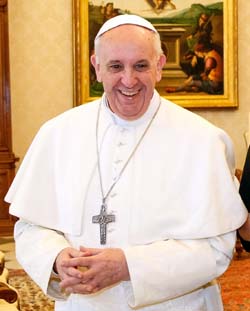In L’Osservatore Romano on 29 May 2018, Cardinal-designate Luis Ladaria, Prefect of the Congregation for the Doctrine of the Faith, wrote an article in which he said,
Christ wanted to give this sacrament to the twelve apostles, all men, who, in turn, communicated it to other men. The Church has always recognized herself bound by this decision of the Lord, which excludes that the ministerial priesthood can be validly conferred on women. ... All (Episcopal Conferences), without exception, have declared, with full conviction, for the obedience of the Church to the Lord, that she does not possess the faculty of conferring priestly ordination on women.
Clyde Christofferson responded on CCRI's Face Book Group saying:
This is an embarrassment to the People of God. On the one hand, it is clear as a bell that this treatment of women by the institutional Church is not "part of the deposit of faith". As Vatican II asserted in Dei Verbum, the deposit of faith is defined by God's self‐revelation in Christ by the power of the Holy Spirit. This is a significant shift from the pre‐Vatican II habit of
equating revelation with a series of propositional statements, some drawn from scripture and some drawn from tradition. The question is not "what does a long accepted propositional statement say about an all male priesthood?" To take that answer at face value is to risk (if not outright commit) idolatry.The better question is "what does God's self‐revelation in Christ by the power of the Holy Spirit say about calls to priestly ministry?" This requires the same kind of discernment that Francis describes in Amoris Laetitia. It is plain that the Spirit continues to call people to priestly ministry without regard to gender. When Paul VI in 1975 rejected the offer of the Archbishop of Canterbury to join the Anglicans in considering the issue of women's ordination, an opportunity was missed. The Church was on doctrinal autopilot set in place before Vatican II. It's a very human mistake. The Church has dug itself a deeper hole.
Clyde recommended two actions:
- The injustice must be called out. People must speak from their own hearts. There will be those who defer to the magisterium, but that deference has a long history and is part of the messiness of life.
- We must work toward recovering the foundations for a "sense of the faithful" that was so rudely stifled at the time of the Gregorian reforms. This is more than calling out injustice. We need to enable and promote an examination of conscience by the institutional Church on this matter. And this will be futile unless we also find a way of conceptualizing Church history so that such an injustice can be admitted without compromising the integrity of the institution.
Organisations around the world have joined in:
